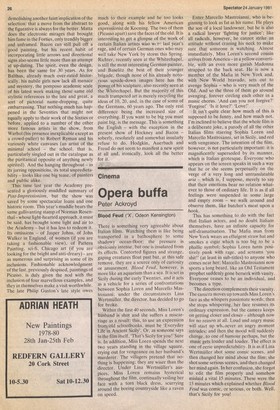Cinema
Opera buffa
Peter Ackroyd
Blood Feud ('X', Odeon Kensington) There is something very agreeable about Italian films. Watching them is like being transported in a bathosphere to some shadowy ocean-floor: the pressure is obviously intense, but one is insulated from its effects. Contorted figures and strange, gaping creatures float past but, at this safe remove, they are a source only of curiosity or amusement. Blood Feud, however, is more like an aquarium than a sea. It is set in Sicily during the early Twenties, and it acts as a vehicle for a series of confrontations between Sophia Loren and Marcello Mastroianni; under the circumstances Lina Wertmiiller, the director, has decided to go for broke.
Within the first 40 seconds, Miss Loren's husband is shot and she suffers a miscarriage as a result: this, to use an expression from old schoolbooks, must be 'Everyday Life in Ancient Sicily'. Or, as someone says in the film itself, 'That's Sicily for you!' Sure is. In addition, Miss Loren spends the next two years standing in the village square, crying out for vengeance on her husband's murderer: The villagers pretend that nothing is happening: they are wiser than the director. Under Lina Wertmtiller's auspices, Miss Loren remains hysterical throughout the film, continually veiling her face with a torn black dress, scurrying around the boring countryside like a raven on speed. Enter Marcello Mastroianni, who is beginning to look as fat as his name. He plays the son of a local landowner, but he is also a radical lawyer 'fighting for justice'; like all radicals, however, he cannot strike an attitude without craning his neck to make sure that someone is watching. Almost immediately, Miss Loren's second cousin arrives from America in a yellow converti ble, with an even more garish Madonna strapped to the back seat. He is now a member of the Mafia in New York and, with New World bravado, sets out to avenge Sophia who is very much of the Old. And so the three of them go around avenging, forever circling each other in a manic chorus. And can you not forgive?' 'Forgive!' Is it love?' Love!'
It isn't quite clear how much of this is supposed to be funny, and how much not.
I'm inclined to believe that the whole film is a deliberate joke, a parody of all the other Italian films starring Sophia Loren and Marcello Mastroianni, set in Sicily, and red with vengeance. The intention of the film, however, is not particularly important: it is magnificently superseded by its manner, which is Italian grotesque. Everyone who appears on the screen speaks in such a way that he or she seems perpetually on the verge of a very long and untranslatable aria which is, I suppose, merely to say that their emotions bear no relation whatever to those of ordinary life. It is as if all feelings were suspended in some large and empty room we walk around and observe them, like butcher's meat upon a hook.
This has something to do with the fact that Italian actors, and no doubt Italians themselves, have an infinite capacity for self-dramatisation. The Mafia man from New York wears an effulgent straw hat and smokes a cigar which is too big to be a phallic symbol; Sophia Loren turns positively punk with rage, and screams 'you shit!' (at least in sub-titles) to anyone who comes near her; Marcello Mastroianni now sports a long beard, like an Old Testament prophet suddenly gone berserk with vanity. Everyone ceases to be an individual, and becomes a type.
The direction complements their vacuity. The camera moves up towards Miss Loren's face as she whispers passionate words; then she stops whispering, her face resumes its ordinary expression, but the camera keeps on getting closer and closer although now for no reason at all. Loud and angry music will stall up wh,never an angry moment intrudes; and then the mood will suddenly change, to one of humour perhaps, but the music gets louder and louder. The effect is one of eerie unpredictability. It is as if Lina Wertmuller shot some comic scenes, and then changed her mind about the film; she shot some serious scenes, and then changed her mind again. In her confusion, she forgot to edit the film properly and somehow mislaid a vital 15 minutes. These were the 15 minutes which explained whether Blood Feud was comic, or serious, or both. Well, that's Sicily for you!






































 Previous page
Previous page